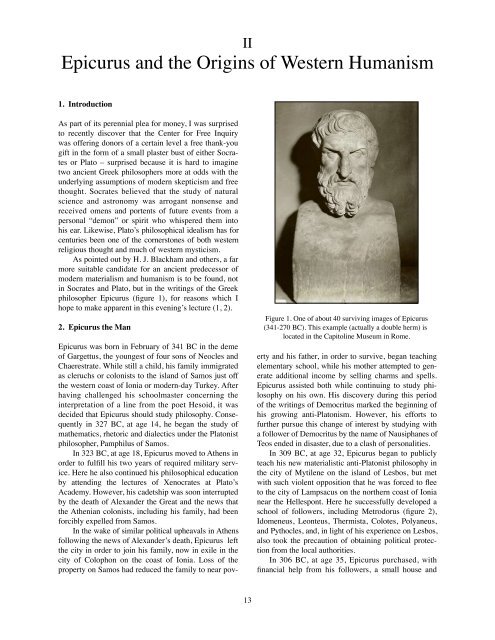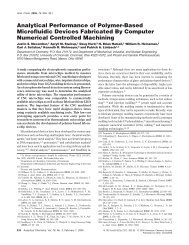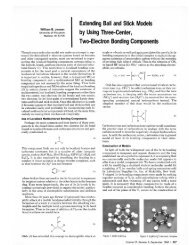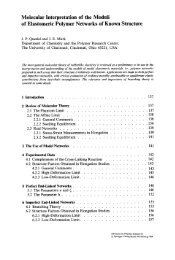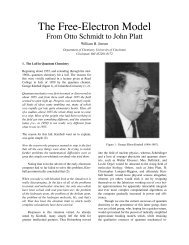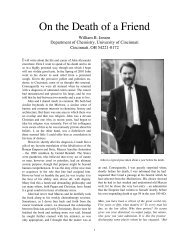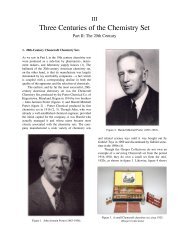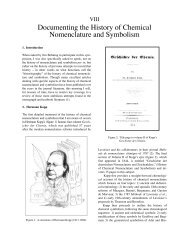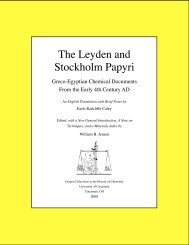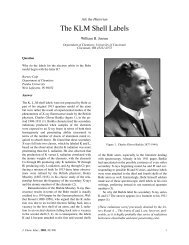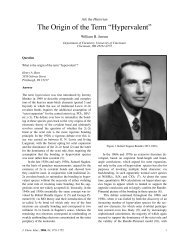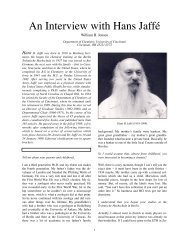Frankenstein's Cat.pdf - University of Cincinnati
Frankenstein's Cat.pdf - University of Cincinnati
Frankenstein's Cat.pdf - University of Cincinnati
Create successful ePaper yourself
Turn your PDF publications into a flip-book with our unique Google optimized e-Paper software.
II<br />
Epicurus and the Origins <strong>of</strong> Western Humanism<br />
1. Introduction<br />
As part <strong>of</strong> its perennial plea for money, I was surprised<br />
to recently discover that the Center for Free Inquiry<br />
was <strong>of</strong>fering donors <strong>of</strong> a certain level a free thank-you<br />
gift in the form <strong>of</strong> a small plaster bust <strong>of</strong> either Socrates<br />
or Plato – surprised because it is hard to imagine<br />
two ancient Greek philosophers more at odds with the<br />
underlying assumptions <strong>of</strong> modern skepticism and free<br />
thought. Socrates believed that the study <strong>of</strong> natural<br />
science and astronomy was arrogant nonsense and<br />
received omens and portents <strong>of</strong> future events from a<br />
personal “demon” or spirit who whispered them into<br />
his ear. Likewise, Plato’s philosophical idealism has for<br />
centuries been one <strong>of</strong> the cornerstones <strong>of</strong> both western<br />
religious thought and much <strong>of</strong> western mysticism.<br />
! As pointed out by H. J. Blackham and others, a far<br />
more suitable candidate for an ancient predecessor <strong>of</strong><br />
modern materialism and humanism is to be found, not<br />
in Socrates and Plato, but in the writings <strong>of</strong> the Greek<br />
philosopher Epicurus (figure 1), for reasons which I<br />
hope to make apparent in this evening’s lecture (1, 2).<br />
2. Epicurus the Man<br />
Figure 1. One <strong>of</strong> about 40 surviving images <strong>of</strong> Epicurus<br />
(341-270 BC). This example (actually a double herm) is<br />
located in the Capitoline Museum in Rome.<br />
Epicurus was born in February <strong>of</strong> 341 BC in the deme<br />
<strong>of</strong> Gargettus, the youngest <strong>of</strong> four sons <strong>of</strong> Neocles and<br />
Chaerestrate. While still a child, his family immigrated<br />
as cleruchs or colonists to the island <strong>of</strong> Samos just <strong>of</strong>f<br />
the western coast <strong>of</strong> Ionia or modern-day Turkey. After<br />
having challenged his schoolmaster concerning the<br />
interpretation <strong>of</strong> a line from the poet Hesoid, it was<br />
decided that Epicurus should study philosophy. Consequently<br />
in 327 BC, at age 14, he began the study <strong>of</strong><br />
mathematics, rhetoric and dialectics under the Platonist<br />
philosopher, Pamphilus <strong>of</strong> Samos.<br />
! In 323 BC, at age 18, Epicurus moved to Athens in<br />
order to fulfill his two years <strong>of</strong> required military service.<br />
Here he also continued his philosophical education<br />
by attending the lectures <strong>of</strong> Xenocrates at Plato’s<br />
Academy. However, his cadetship was soon interrupted<br />
by the death <strong>of</strong> Alexander the Great and the news that<br />
the Athenian colonists, including his family, had been<br />
forcibly expelled from Samos.<br />
! In the wake <strong>of</strong> similar political upheavals in Athens<br />
following the news <strong>of</strong> Alexander’s death, Epicurus left<br />
the city in order to join his family, now in exile in the<br />
city <strong>of</strong> Colophon on the coast <strong>of</strong> Ionia. Loss <strong>of</strong> the<br />
property on Samos had reduced the family to near poverty<br />
and his father, in order to survive, began teaching<br />
elementary school, while his mother attempted to generate<br />
additional income by selling charms and spells.<br />
Epicurus assisted both while continuing to study philosophy<br />
on his own. His discovery during this period<br />
<strong>of</strong> the writings <strong>of</strong> Democritus marked the beginning <strong>of</strong><br />
his growing anti-Platonism. However, his efforts to<br />
further pursue this change <strong>of</strong> interest by studying with<br />
a follower <strong>of</strong> Democritus by the name <strong>of</strong> Nausiphanes <strong>of</strong><br />
Teos ended in disaster, due to a clash <strong>of</strong> personalities.<br />
! In 309 BC, at age 32, Epicurus began to publicly<br />
teach his new materialistic anti-Platonist philosophy in<br />
the city <strong>of</strong> Mytilene on the island <strong>of</strong> Lesbos, but met<br />
with such violent opposition that he was forced to flee<br />
to the city <strong>of</strong> Lampsacus on the northern coast <strong>of</strong> Ionia<br />
near the Hellespont. Here he successfully developed a<br />
school <strong>of</strong> followers, including Metrodorus (figure 2),<br />
Idomeneus, Leonteus, Thermista, Colotes, Polyaneus,<br />
and Pythocles, and, in light <strong>of</strong> his experience on Lesbos,<br />
also took the precaution <strong>of</strong> obtaining political protection<br />
from the local authorities.<br />
! In 306 BC, at age 35, Epicurus purchased, with<br />
financial help from his followers, a small house and<br />
13


